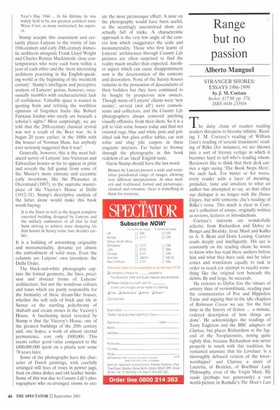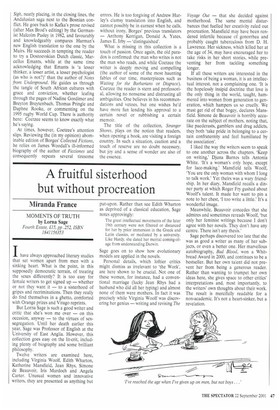Range but no passion
Alberto Manguel
STRANGER SHORES: ESSAYS 1986-1999
by J. M. Coetzee Seeker, £17.99, pp. 374, ISBN 0436 233916
The daisy chain of readers reading readers threatens to become infinite. Reading J. M. Coetzee's reading of William Gass's reading of several translators' reading of Rilke (for instance), we are thrown into a sort of literary vertigo in which it becomes hard to tell who's reading whom. Reviewers like to think that their desk carries a sign saying 'The Book Stops Here'. No such luck. For better or for worse, every reader adds a layer of meaning, prejudice, taste and intuition to what an author has attempted to say, so that often our dialogue is no longer with the Duino Elegies, but with someone else's reading of Rilke's verse. This much is clear in Coetzee's collection of essays, originally written as reviews, lectures or introductions.
Coetzee's interests are wonderfully eclectic: from Richardson and Defoe to Borges and Brodsky, from Musil and Kafka to A. S. Byatt and Doris Lessing. Coetzee reads deeply and intelligently. His eye is constantly on the reading chain; he wants to know who has read these authors before him and what they have said, and he takes critics and translators equally to task in order to reach (or attempt to reach) something like the original text beneath the debris. By and large, he succeeds.
He restores to Defoe less the virtues of artistry than of verisimilitude, reading past the commentaries of Poe and Hippolyte Taine and arguing that in the idle chapters of Robinson Crusoe we see `for the first time in the history of fiction ... a minute, ordered description of how things are done'. He acknowledges the readings of Terry Eagleton and the BBC adapters of Clarissa, but places Richardson at the fagend of the Neoplatonists, noting quite rightly that, because Richardson was never properly in touch with this tradition, he remained unaware that his Lovelace 'is a thoroughly debased version of the loverworshipper' and Clarissa a sister of Lucretia, of Beatrice, of Boethius' Lady Philosophy, even of the Virgin Mary. He reads (perhaps too generously) a vast world-picture in Rushdie's The Moor's Last Sigh, neatly placing, in the closing lines, the Andalusian saga next to the Bosnian conflict. He goes back to Kafka's prose revised (after Max Brod's editing) by the Germanist Malcolm Pasley in 1982, and favourably and knowledgeably compares Harman's new English translation to the one by the Muirs. He succeeds in tempting the reader to try a Dostoevskian Dutch classic, Marcellus Emants, while at the same time acknowledging that Emants is 'a lesser thinker, a lesser artist, a lesser psychologist (as who is not?)' than the author of Notes from Underground. He guides us through the tangle of South African cultures with grace and conviction, whether leafing through the pages of Nadine Gordimer and Breyton Breytenbach, Thomas Pringle and Daphne Rooke, or commenting on the 1995 rugby World Cup. There is authority here: Coetzee seems to know exactly what he's saying.
At times, however, Coetzee's attention slips. Reviewing the (in my opinion) abominable edition of Borges' Collected Fictions, he relies on James Woodall's ill-informed biography of the author of Ficciones and consequently repeats several tiresome errors. He is too forgiving of Andrew Hurley's clumsy translation into English, and cannot possibly be in earnest when he calls, without irony, Borges' previous translators — Anthony Kerrigan, Donald A. Yates, James E. Irby — 'distinguished'.
What is missing in this collection is a touch of passion. Once again, the old paradox is confirmed: the man who writes is not the man who reads, and while Coetzee the writer is deeply moving and compelling (the author of some of the most haunting fables of our time, masterpieces such as Waiting for the Barbarians or Disgrace), Coetzee the reader is stern and professorial, allowing no nonsense and distrusting all ambiguities. One believes in his recommendations and vetoes, but one wishes he'd have more fun lending his approval to a certain novel or rubbishing a certain memoir.
The title of the collection, Stranger Shores, plays on the notion that readers, when opening a book, are visiting a foreign country. In such a situation, caution and a touch of reserve are no doubt necessary, but joy and a sense of wonder are also of the essence.











































































 Previous page
Previous page